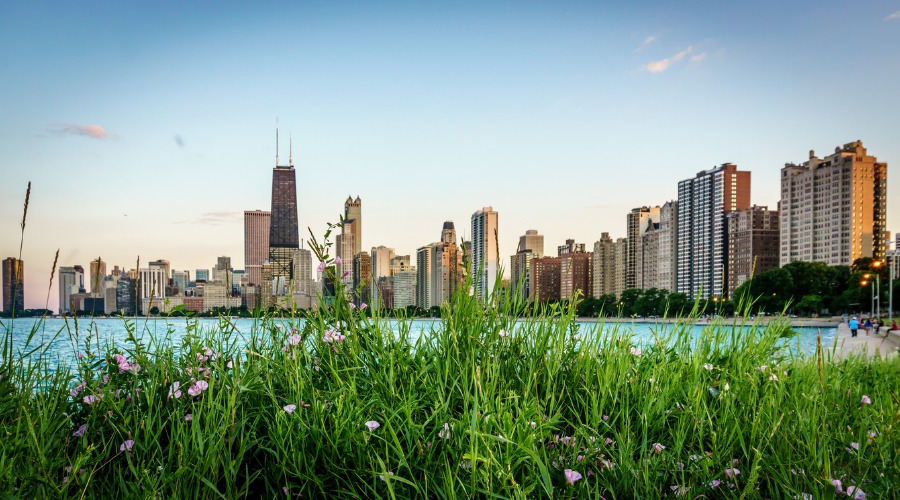The Latest From Chicago: Anti-Retaliation, Fair Workweek, and Food Delivery Disclosures

While warm weather has finally hit Chicago, Mayor Lightfoot, the City Council and Chicago Department of Business Affairs and Consumer Protection (BACP) have not taken a spring break. The below summarizes the latest ordinances, and regulations from the Windy City:
Anti-Retaliation Ordinance
The Chicago City Council passed the COVID-19 Anti-Retaliation Ordinance last week, which prohibits employers from retaliating against employees for obeying a public health order requiring an employee to stay home due to coronavirus.
The Ordinance prohibits employers from demoting or terminating a Covered Employee for obeying an order issued by the Mayor, the Governor of Illinois, the Chicago Department of Public Health, or, in the case of (2), (3), and (4) below, a treating healthcare provider, requiring the Covered Employee to:
- Stay at home to minimize the transmission of COVID-19;
- Remain at home while experiencing COVID-19 symptoms or sick with COVID-19;
- Obey a quarantine order issued to the Covered Employee;
- Obey an isolation order issued to the Covered Employee; and
- Obey an order issued by the Commissioner of Health regarding the duties
- of hospitals and other congregate facilities
Employees subject to demotion or termination may recover reinstatement, damages equal to three times the full amount of wages that would have been owed had the retaliatory action not taken place, actual damages, and attorneys’ fees. Violations may also lead to fines of up to $1,000 per offense per day.
The ordinance is effective immediately.
Fair Workweek Ordinance
Chicago’s Fair Workweek Ordinance is set to take effect on July 1, 2020. Ahead of the effective date, the BACP has issued rules for implementing the ordinance, and a supplemental rule for implementation during the pandemic.
The Ordinance requires covered employers to post work schedules at least 10 days in advance, and provide additional pay if work schedules are changed without advanced notice. However, the Ordinance creates an exception where the work schedule change is “because of” a pandemic. BACP’s supplemental rule clarifies that the COVID-19 outbreak qualifies as a “pandemic” for the purposes of this exception, and will remain a “pandemic” until the Mayor’s Executive Order declaring a state of emergency is repealed.
However, a work schedule change will be considered “because” of the pandemic only when the pandemic causes the employer to materially change its operating hours, operating plan, or the goods or services provided by the employer, resulting in the work schedule change. Further, the exception applies only to the work schedule during which the change occurs, and the work schedule immediately following.
Additionally, while the substantive requirements of the Ordinance will still go into effect on July 1, 2020 and may still be enforced by the City, individual employees will not be allowed to file lawsuits for violations of the ordinance occurring before January 1, 2021.
New Rules for Third Party Food Delivery Companies
Mayor Lightfoot and the BACP announced new rules earlier this month for third-party food delivery companies to increase transparency and fair competition. Effective Friday, May 22nd, all third-party delivery companies must disclose the following to customers, in a “clear and conspicuous manner”:
- the menu price of the food;
- any sales or other tax applied to the transaction;
- any delivery charge or service fee, imposed on or collected from the customer by the third-party food delivery service or by the covered establishment, in addition to the menu price of the food;
- any tip that will be paid to the person delivering the food, and not to the third-party food delivery service, to be added into the transaction when it occurs, and
- any commission associated with the transaction.
The disclosure requirements apply to all websites, mobile applications or other internet services that offer or arrange the sale of food or beverages by a restaurant, bar or other food-serving establishments. The measure is intended to promote transparency and fair competition, as many restaurants are increasing relying on third-party delivery services to stay afloat during the pandemic.
While the rules were promulgated in response to the pandemic, these new rules will be in place permanently.
Guidance for Restaurants Applying COVID Surcharges
The City of Chicago issued a guidance for restaurants charging COVID-related surcharges to customers, reminding restaurants that the City’s restaurant tax is .50%, and any surcharge customers are required to pay is considered taxable and should be included in the basis upon which the restaurant tax is calculated. Additionally, a COVID surcharge is not a tax and should not be designated as such on any price list or invoice.